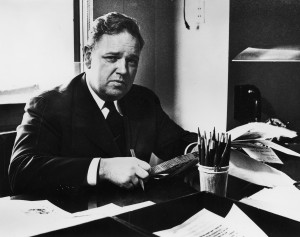About seven years ago, a vision took shape in my heart and mind. Yesterday that vision may have died, but I am hopeful that it’s merely a prelude to a resurrection. Let me explain. I’ll start first with the basic facts, then go on to what I think the Lord may be teaching me through this episode.
 I’ve always admired Ronald Reagan: his character, his principles, and how he attempted to convert them into action. I’ve equally admired Whittaker Chambers, a man less well known than Reagan, but one who was instrumental in sending a warning to Western Civilization that it must return to faith in God or all will be lost. Reagan was the quintessential optimist; he believed freedom was the wave of the future. Conversely, Chambers was the epitome of the Old Testament prophet Jeremiah, who held out hope but whose message was primarily one of judgment.
I’ve always admired Ronald Reagan: his character, his principles, and how he attempted to convert them into action. I’ve equally admired Whittaker Chambers, a man less well known than Reagan, but one who was instrumental in sending a warning to Western Civilization that it must return to faith in God or all will be lost. Reagan was the quintessential optimist; he believed freedom was the wave of the future. Conversely, Chambers was the epitome of the Old Testament prophet Jeremiah, who held out hope but whose message was primarily one of judgment.
 Both men are considered cornerstones of modern American conservatism. Yet even though they were part of the same movement, their perspectives on the ultimate success of a West grounded in a Biblical worldview differed significantly. My goal was to examine the roots of Reagan’s optimism and Chambers’s pessimism, show how those diametrically opposite temperaments manifested themselves during their lives, and then evaluate, to the extent it is possible, which viewpoint is more accurate with respect to the future of freedom.
Both men are considered cornerstones of modern American conservatism. Yet even though they were part of the same movement, their perspectives on the ultimate success of a West grounded in a Biblical worldview differed significantly. My goal was to examine the roots of Reagan’s optimism and Chambers’s pessimism, show how those diametrically opposite temperaments manifested themselves during their lives, and then evaluate, to the extent it is possible, which viewpoint is more accurate with respect to the future of freedom.
For seven years, off and on while teaching fulltime, moving from Virginia to Florida, and blogging daily, I slowly made headway on the book. My search for a publisher was difficult until last November when an academic press gave me a contract. It wasn’t until after I signed that contract that I fully understood some of the ramifications: I would have to pay for the typesetting and for any permission fees for the use of quotes from other sources. I also didn’t realize that I was not guaranteed a paperback version of the book. It was slated to come out in hardback only, and would be turned into a paperback if it sold well enough, which would be difficult because the price tag was going to be over $60. How many people are currently willing to pay that much for a book?
Nevertheless, I moved forward with all that was necessary to submit the manuscript, simultaneously making the case for a paperback version. Things seemed to be going in that direction, and one scholar who reviewed the book for the publisher—a man who is a Reagan expert and has written a number of Reagan books—was so delighted with my manuscript that he even wrote a wonderful foreword for it.
I was also getting all the permissions together, and pretty successful at getting those fees down to a reasonable level. One source, though, that had rights to two of the books I quoted from extensively, required a fee that was far above all others, and one that I just couldn’t pay. It would have been fiscal suicide for me to have done so. Even communication with the publisher didn’t change that source’s opinion on how high the fee had to be.
Therefore, my publisher and I came to a mutual agreement yesterday to dissolve the contract. The book is dead.
But is it, really?
I admit my first reaction a week ago to the fee demand was one of anger, which then turned to discouragement. All I could think about was seven years of labor wasted. Slowly, though, as I meditated on what God would want me to think and to do, I began to see things from a different angle. Perhaps this was His way of getting me out of a bad situation; maybe another door will now open, one that won’t be so restrictive.
He reminded me of the many times in my life when I came to a point of near-despair over some turn of events. One in particular always comes to mind. Eighteen years ago, I was a candidate for a teaching position at an evangelical college on the West Coast. I recall how my office would have faced the rolling waves of the Pacific Ocean; I was sure this was God’s call for me. When I didn’t get the position, I was devastated. Anger and resentment burned within me over what I considered to be a bad decision by that college. Yet a couple of months later, out of the blue and totally unanticipated, I was contacted by a university where I had sought to teach earlier. Within a matter of days, I had that position, and it was one that was truly fulfilling for a number of years. I learned a valuable lesson: God is always at work even when you don’t see the evidence at first; trust Him and He will guide your steps.
There may be another lesson He is teaching me through this current mini-crisis. It’s possible I was too focused on academic credentials as I sought to get this book published. Perhaps I wanted to impress others a bit too much, and pride was taking hold of my heart. The Lord reminded me that humility is the way to please Him. If I never publish another book, that’s okay, as long as I am doing what He has called me to do—teach this generation His ways through history.
I am at peace with the state of my manuscript. I believe I’ve written something that is worthwhile, and I will see if another publisher is willing to take it on. I don’t know if that publisher exists, but if God wants it to be published, it shall be. Meanwhile, I will continue to do my best with the tasks He has given me already.
I just finished reading the book of Ecclesiastes again. The theme throughout that book is the futility of any work that is done purely in one’s own strength or for one’s own purposes. The last chapter offers the sort of wisdom we all need, but especially someone in my field:
But beyond this, my son, be warned: the writing of many books is endless, and excessive devotion to books is wearying to the body. The conclusion, when all has been heard, is: fear God and keep His commandments, because this applies to every person. For God will bring every act to judgment, everything which is hidden, whether it is good or evil.
I take that admonition to heart.
